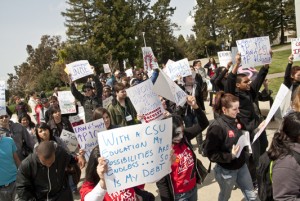Students being used as the voice for faculty members raises ethical concerns.

The April 13 “Class Action” protest targeted against Chancellor Reed was promoted as a statewide faculty protest.
So why is it that students here at CSU East Bay were the ones standing on the frontline, so to speak, while members of the California Faculty Association stood back and watched?
It is understandable that the CFA would push for student involvement, because when it comes to protesting to get a point across, the general consensus is usually the “more the merrier,” but to use students simply as vessels is unethical.
The day started off with the CFA taking the lead, as it should have been, choosing not to teach their formal classes for the day and instead doing mini teach-in sessions, educating students and event-goers about various topics.
Though the teach-ins were sometimes a little off topic, including one about a more ecologically friendly shuttle system, and students were lured to the event with free ice cream, the faculty were at least in charge of the event.
However, after the teach-ins and ice cream were finished, the CFA gathered student activists at the event and prompted them to “have their voices heard.”
A group about 150 strong, consisting of something close to 130 students and maybe 20 faculty members, marched up to the Student Administration building to protest in front of CSUEB President Qayoumi’s office.
Students were pushing for the CFA’s demands to be met—which on the whole don’t really have much to do with students directly—but by the time the group reached the office, only about five faculty members remained.
What the protest had turned into, in my opinion, was a screaming free-for-all, prompted by the CFA but followed through by students who are angry over classes being cut and tuition being raised, but really don’t know who to be angry at.
Case in point, if the protest was to urge Chancellor Reed to resign, why would students go to President Qayoumi’s office? Not only was the President not in his office that day, but the Chancellor certainly wasn’t there.
What students don’t seem to realize is that the best way to solve the budget crisis is to lobby for a legislature that favors education.
Going to the University President’s office to yell about lower gas prices, better air conditioning and immigration policies—yes, students actually did start yelling about those topics—will not solve anything.
In all honesty, it was hard for me to take the group seriously after some students got off topic. Who would take that seriously?
Additionally, members of the CFA actually handed me, and every other student at the protest, an Arrestee Intake Form, as well as a handout on knowing your legal rights that included propaganda phrases like, “Don’t wait for the cops to read you your rights. They usually won’t.”
It was almost like the CFA was trying to rile up the students even more to push them to get arrested to make some point about being oppressed.
Perhaps the faculty members remember the impact made by students in Berkeley in 1969, but comparatively this generation of students is pretty conservative.
I would also imagine that it’s pretty difficult to get an education from jail.
What’s really upsetting about this whole ordeal is that it is very important for students and faculty members to be on the same page within a University so that changes can be made to better serve the students.
This is why students need to take the initiative to do their own research and find what they believe in instead of simply repeating what their professors tell them so the best possible solutions can be worked out.







